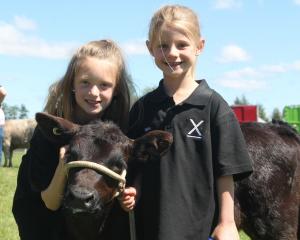
Going to the dogs is a common saying.
But in the case of AbacusBio consultant Shalini Kumar, she has gone to the goats — and she could not be happier about it.
Dr Kumar is helping develop a partnership with the largest poultry supply chain company in India to help it build a goat meat supply chain business.
Having recently returned from three months in India, it was a project that was dear to Dr Kumar’s heart, given she was brought up in the country.
She was "immensely driven" and passionate about bringing change and also giving back to the community where she spent 28 years.
Originally from Kerala, a tropical area in southern India, Dr Kumar describes herself as a scientist by training, a consultant by profession, an innovator and artist by nature, and a mother to a 6-year-old.
From the time she could remember, she wanted to be a scientist; her family was against it — her father wanted her to go into the arts space — and she had to "put up a fight" to follow her dream.
Her background was in human medical research; she previously had no agricultural experience.
She undertook her PhD at the University of Otago in 2017, in the physiology department, where she looked at the maternal brain and how it regulated pregnancy.
She completed that in 2020 and four weeks later she joined agribusiness consulting firm AbacusBio.
Having been accepted for a scholarship for University of Otago, it was "such a great experience" and she could not have asked for anything more, she said.
Then, at AbacusBio, she was genuinely touched by the team who had been so welcoming, and had a culture of empathy and kindness, she said.
She might not have had agricultural experience but she did come with a passion for animals and plants; she had always imagined ending up a wildlife biologist at some point.

The association began when he was a panellist on a webinar the university had organised, outlining what he was looking for in future candidates.
He gave a list of qualities or skills and she realised she ticked all of them. So she got in touch immediately and he agreed to meet her for lunch, along with former managing director Dr Anna Campbell.
That was on Friday and, after agreeing to see how it went, she started working there the following week — a few months later, she was made a permanent staff member.
The role fitted her aims perfectly as she wanted to "crack into industry" and not stay in academia any longer, preferring to move from that end of the spectrum to the other end where the impact and results were.
India was one of the world’s largest producers of goats, and had one of the largest varieties of indigenous breeds.
AbacusBio had a client in India, the Aga Khan Foundation, which had been working in Bihar, a state in the eastern part of the country.
It was one of the poorest states economically; the vast majority of residents were below the poverty line.
The foundation aimed to uplift people through the various sectors, including education, health and agriculture.
As part of the agriculture sector, they had been supplying goats to people.
Goats were like "the poor man’s cow" — they were treated like their owner’s personal ATM and were sold if money was required, Dr Kumar said.
The Black Bengal breed was known for its meat, and the aim was to improve the quality of the animal. AbacusBio partnered with Indian sheep and goat geneticist Dr Chanda Nimbkar, director at Nimbkar Agricultural Research Institute, to work together to improve genetics.
A community-based breeding programme had been under way over the last four years and there were some "great results" coming from it, Dr Kumar said.
The quality of the goats was improving, and the local people were accepting the programme and seeing the benefits of it.
Better animals meant more money for the animal, putting the owners in a better financial situation and allowing them to improve access to the likes of education and healthcare.
It was women who were mostly the goat rearers, and it was empowering to see how they were gaining financial independence.
The success of the programme was when communities accepted it, and that had happened. More villages wanted to be part of the process, she said.

Prior to the Covid-19 pandemic, discussions had been held with the poultry processing company. The pandemic halted progression but now the company was keen to revisit the possibility.
As part of her visit to India, Dr Kumar met representatives from the company, which was an "amazing experience".
"They are leaders in what they are doing and they know what they need," she said.
At the moment, there was also no proper policy on goat or sheep breeding in India, so a meeting was also held around goat breeding policies, which the Ministry of Agriculture recognised a need for.
It had been a very fulfilling trip, and one she described as "life changing on a professional scale".
"I had to do it all on my own."
She also had an opportunity to catch up with family.
She saw potential and opportunities within the various agricultural sectors in India. Food security was a big issue and that needed addressing, she said.
Eighteen months on from joining AbacusBio, Dr Kumar said she was "absolutely loving" the work she did for the company, which included other projects.
It was funny how things worked out; she was supposed to come to New Zealand in 2010 when an opportunity arose to do a PhD on beef genetics, at Lincoln University, but she could not do it due to personal reasons.
"Everything has its time," she said.














